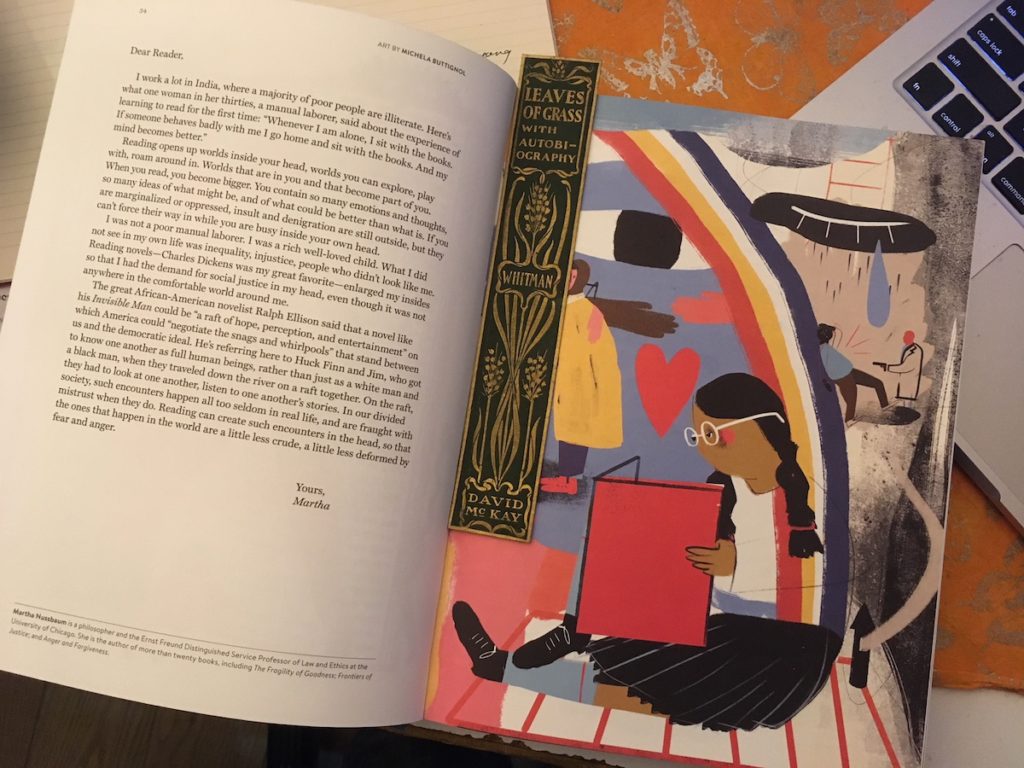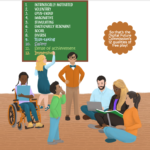
A Velocity of Being. Great title, isn’t it? And this book of 121 letters to young readers (with accompanying art for each letter) edited by Maria Popova and Claudia Bedrick stands up to its title. I mentioned in my last post my intention to read a letter a day.
“My intention is to read one letter a day until I finish, but I notice I have gotten sidetracked easily. Maybe one a week would be achievable…or alternatively, put that big old book right in the middle of my desk every night so that when I start my day, I have to either read it, or move it out of my way…we shall see.”
I wanted to report that the big old book right in the middle of my desk every night so that when I start my day I actually see it and read it strategy is working.
I’ll be doing a few presentations in the coming week (if you’re in the Bay Area, join me Sunday, 3 pm at the Albany Library, 1247 Marin Ave. in the East Bay. I’m also speaking at Family Sanity on January 30, 7 pm. Scroll down the page here for information on that event). In preparation, I’m digging into some of the recent research on young people and tech. Several writers (see Scientific American, Wired for a few) are talking about new research by Andrew Przybylski, an experimental psychologist at Oxford, and his graduate student Amy Orben. Scientific American writer Lydia Denworth summed it up the best in the least amount of words in her article “The Kids (Who Use Tech) Seem to Be All Right.” Right now, best summary/least words counts for a lot because I’m feeling pretty buried in text. I’m guessing you are too.
She writes:
“Social media is linked to depression—or not. First-person shooter video games are good for cognition—or they encourage violence. Young people are either more connected—or more isolated than ever.
Such are the conflicting messages about the effects of technology on children’s well-being. Negative findings receive far more attention and have fueled panic among parents and educators. This state of affairs reflects a heated debate among scientists. Studies showing statistically significant negative effects are followed by others revealing positive effects or none at all—sometimes using the same data set.”
Wired writer Robbie Gonzalez ends his piece “Screens Might Be as Bad for Mental Health as…Potatoes” with a great quote from University of California Irvine psychologist Candice Odgers. He writes:
“Not all screen time is created equal, but most studies to date treat it as monolithic. ‘That’s like asking if food is good or bad for you, and in the end, questions like that will never help us,’ Orben says. ‘We need to stop the debate about the effect of generic tech use on well-being and open space for more and better research about the kind of technologies people are using, who’s using them, and how.'”
Przybylski and Orben, and Candice Odgers shed some light on our dilemma. I appreciate their work. I recommend that you make the time to read the Scientific American article and the Wired article, and if you’re really feeling bold, dig into the Orben and Pryzbylski paper, “The association between adolescent well-being and technology use” here.
Must get up from this desk. I’ve been sitting here too long. I’m glad I start my day outside. I’m thinking of those seagulls I watched this morning working that green green soccer field for worms. And the crisp morning air…


